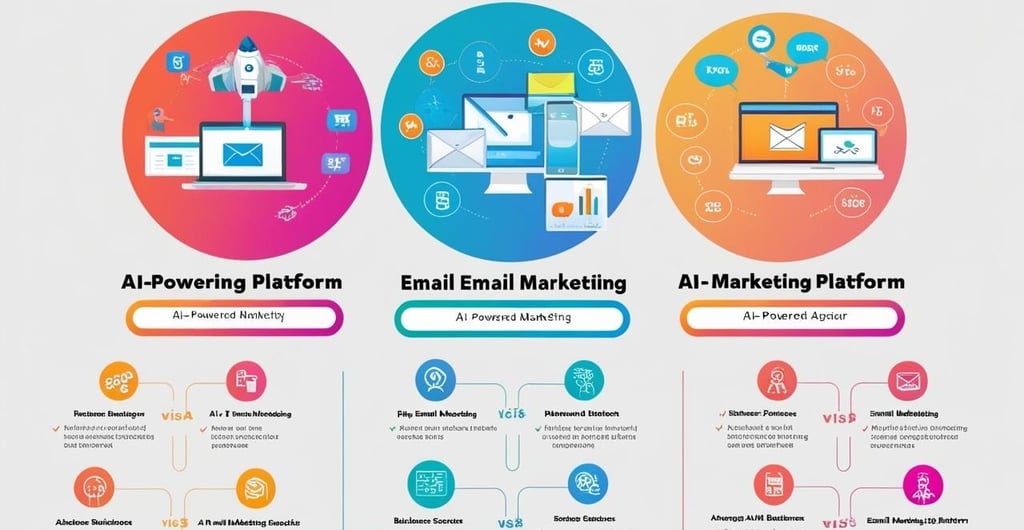AI-Powered Email Marketing Platforms Comparison: The Future of Marketing Automation
"Explore the best AI-powered email marketing platforms in this comprehensive comparison. Discover advanced features like personalization, automation, and analytics, helping marketers choose the right tools to enhance engagement, boost conversions, and drive future marketing success."
AI TOOLS DIRECTORY


In today's fast-paced digital landscape, email marketing remains a cornerstone of successful business strategies. However, the introduction of AI-powered email marketing platforms is revolutionizing how brands engage their audience. This transformation combines the art of communication with the science of automation, delivering hyper-personalized experiences at scale. In this comprehensive guide, we’ll explore the top AI-powered email marketing platforms, their standout features, and how they are shaping the future of marketing automation.
What Makes AI Email Marketing Platforms Unique?
AI email marketing platforms leverage artificial intelligence to analyze data, predict outcomes, and automate tasks. This capability transcends traditional email marketing by providing:
1. Personalization at Scale: AI algorithms analyze customer behavior to tailor content for individual preferences.
2. Advanced Analytics: Real-time insights help marketers understand campaign performance and refine strategies.
3. Predictive Analysis: AI forecasts customer actions, improving targeting and reducing churn.
4. Automation Beyond Basics: AI handles complex workflows, such as dynamic content generation and optimal send-time scheduling.
These features help marketers achieve higher ROI, streamline workflows, and foster stronger connections with audiences.
Top AI-Powered Email Marketing Platforms
Let’s dive into a comparison of leading AI-driven email marketing platforms that are reshaping the marketing landscape.
1. Mailchimp
Overview: Mailchimp is a popular choice for businesses of all sizes. Its integration of AI-driven insights helps marketers craft campaigns that resonate.
Key Features:
- Smart Recommendations: AI suggests subject lines, content, and images to optimize engagement.
- Behavioral Targeting: Tracks user interactions to deliver personalized content.
- A/B Testing Powered by AI: Evaluates multiple variables to determine the most effective combinations.
Pros:
- Easy-to-use interface.
- Comprehensive analytics dashboard.
- Flexible pricing for small to large businesses.
Cons:
- Limited advanced AI features in lower-tier plans.
2. ActiveCampaign
Overview: ActiveCampaign stands out for its robust automation capabilities, powered by AI-driven tools.
Key Features:
- Predictive Sending: Optimizes email send times for each recipient.
- Advanced Segmentation: AI creates detailed customer segments based on behavior and preferences.
- Email Content Personalization: Dynamically adjusts content for individual users.
Pros:
- Seamless CRM integration.
- Extensive automation templates.
- Excellent customer support.
Cons:
- Steeper learning curve for beginners.
3. HubSpot
Overview: HubSpot’s Marketing Hub integrates AI to deliver powerful email marketing solutions within its broader CRM ecosystem.
Key Features:
- AI-Powered A/B Testing: Identifies optimal email elements.
- Smart Content Recommendations: Tailors content based on user personas.
- Workflow Automation: Manages multi-channel campaigns with precision.
Pros:
- Holistic marketing and sales platform.
- Scalability for growing businesses.
Cons:
- Higher pricing tiers may deter small businesses.
4. Sendinblue
Overview: Sendinblue excels in offering budget-friendly solutions with robust AI capabilities.
Key Features:
- AI-Driven Segmentation: Creates dynamic segments for targeted campaigns.
- Predictive Analysis: Improves campaign planning by forecasting outcomes.
- Multichannel Marketing: Combines email with SMS and chat features.
Pros:
- Affordable pricing plans.
- User-friendly interface.
- Strong focus on GDPR compliance.
Cons:
- Limited integrations compared to competitors.
5. Drip
Overview: Drip is designed for eCommerce brands, leveraging AI to deliver personalized shopping experiences.
Key Features:
- Behavioral Targeting: Tracks user actions to create tailored recommendations.
- Dynamic Product Recommendations: AI suggests products based on browsing and purchase history.
- Advanced Campaign Insights: Provides actionable data to optimize performance.
Pros:
- Deep focus on eCommerce.
- Powerful integration with popular eCommerce platforms.
Cons:
- May not be ideal for non-eCommerce businesses.
6. Omnisend
Overview: Omnisend combines AI with omnichannel capabilities to provide a seamless customer journey.
Key Features:
- AI-Optimized Automation: Ensures campaigns are delivered at the right time.
- Smart Segmentation: Groups customers based on their interactions and preferences.
- Cross-Channel Campaigns: Integrates email, SMS, and social ads.
Pros:
- Excellent for omnichannel strategies.
- Affordable for small businesses.
Cons:
- Limited advanced AI features compared to other platforms.
Key Considerations When Choosing an AI-Powered Email Marketing Platform
When selecting the right platform for your business, consider the following factors:
1. Business Goals: Ensure the platform aligns with your marketing objectives.
2. Budget: Compare pricing plans and assess long-term scalability.
3. Ease of Use: Opt for a platform with a user-friendly interface.
4. Integration: Ensure compatibility with your existing tools and systems.
5. Support: Evaluate the quality of customer support and resources.
The Future of AI in Email Marketing
The evolution of AI in email marketing shows no signs of slowing. Here are some trends to watch:
1. Hyper-Personalization
AI will further refine personalization, enabling one-to-one communication at scale. From dynamic content to tailored product recommendations, the future lies in delivering relevance.
2. Advanced Predictive Analytics
Marketers will leverage AI to predict customer lifetime value, optimal communication frequency, and conversion probabilities.
3. Integration with Emerging Technologies
AI-driven platforms will integrate with augmented reality (AR) and voice assistants, creating immersive email experiences.
4. Enhanced Automation
Automation will extend beyond email to encompass holistic customer journeys, integrating multiple touchpoints.
5. Focus on Data Privacy
AI platforms will prioritize compliance with evolving data privacy regulations, ensuring secure and ethical use of customer data.
Conclusion
AI-powered email marketing platforms are transforming the way businesses connect with their audiences. By leveraging advanced analytics, predictive insights, and automation, these tools enable marketers to deliver highly targeted, effective campaigns. As AI technology continues to evolve, adopting an AI-driven approach will no longer be optional but essential for staying competitive in the digital marketing landscape.
Choose a platform that aligns with your business needs, and embrace the future of marketing automation with confidence. Whether you're a small business or a global enterprise, AI-powered email marketing can be the game-changer you’ve been seeking.
Read more relevant articles: "Top AI Tools for Freelancers in 2024: Enhance Your Productivity and Creativity".

